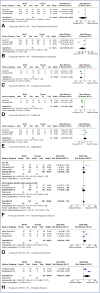Inositol for Polycystic Ovary Syndrome: A Systematic Review and Meta-analysis to Inform the 2023 Update of the International Evidence-based PCOS Guidelines
- PMID: 38163998
- PMCID: PMC11099481
- DOI: 10.1210/clinem/dgad762
Inositol for Polycystic Ovary Syndrome: A Systematic Review and Meta-analysis to Inform the 2023 Update of the International Evidence-based PCOS Guidelines
Erratum in
-
Correction to: "Inositol for Polycystic Ovary Syndrome: A Systematic Review and Meta-analysis to Inform the 2023 Update of the International Evidence-based PCOS Guidelines".J Clin Endocrinol Metab. 2024 Nov 18;109(12):e2365. doi: 10.1210/clinem/dgae588. J Clin Endocrinol Metab. 2024. PMID: 39208274 Free PMC article. No abstract available.
Abstract
Context: Insulin resistance is common in women with polycystic ovary syndrome (PCOS). Inositol may have insulin sensitizing effects; however, its efficacy in the management of PCOS remains indeterminate.
Objective: To inform the 2023 international evidence-based guidelines in PCOS, this systematic review and meta-analysis evaluated the efficacy of inositol, alone or in combination with other therapies, in the management of PCOS.
Data sources: Medline, PsycInfo, EMBASE, All EBM, and CINAHL from inception until August 2022.
Study selection: Thirty trials (n = 2230; 1093 intervention, 1137 control), with 19 pooled in meta-analyses were included.
Data extraction: Data were extracted for hormonal, metabolic, lipids, psychological, anthropometric, reproductive outcomes, and adverse effects by 1 reviewer, independently verified by a second.
Data synthesis: Thirteen comparisons were assessed, with 3 in meta-analyses. Evidence suggests benefits for myo-inositol or D-chiro-inositol (DCI) for some metabolic measures and potential benefits from DCI for ovulation, but inositol may have no effect on other outcomes. Metformin may improve waist-hip ratio and hirsutism compared to inositol, but there is likely no difference for reproductive outcomes, and the evidence is very uncertain for body mass indexI. Myo-inositol likely causes fewer gastrointestinal adverse events compared with metformin; however, these are typically mild and self-limited.
Conclusion: The evidence supporting the use of inositol in the management of PCOS is limited and inconclusive. Clinicians and their patients should consider the uncertainty of the evidence together with individual values and preferences when engaging in shared decision-making regarding the use of inositol for PCOS.
Keywords: inositol; nutrients; polycystic ovary syndrome.
© The Author(s) 2024. Published by Oxford University Press on behalf of the Endocrine Society.
Figures





References
-
- Joham AE, Norman RJ, Stener-Victorin E, et al. Polycystic ovary syndrome. Lancet Diabetes Endocrinol. 2022;10(9):668‐680. - PubMed
-
- Azziz R, Carmina E, Chen Z, et al. Polycystic ovary syndrome. Nat Rev Dis Primers. 2016;2(1):16057. - PubMed
-
- Lim SS, Davies MJ, Norman RJ, Moran LJ. Overweight, obesity and central obesity in women with polycystic ovary syndrome: a systematic review and meta-analysis. Hum Reprod Update. 2012;18(6):618‐637. - PubMed
-
- Cassar S, Misso ML, Hopkins WG, Shaw CS, Teede HJ, Stepto NK. Insulin resistance in polycystic ovary syndrome: a systematic review and meta-analysis of euglycaemic-hyperinsulinaemic clamp studies. Hum Reprod. 2016;31(11):2619‐2631. - PubMed
Publication types
MeSH terms
Grants and funding
LinkOut - more resources
Full Text Sources
Medical

